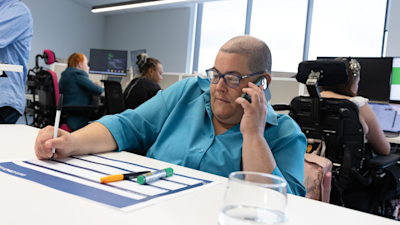We stand in solidarity with the LGBTQIA+ community on IDAHOBIT, and every day.
International Day Against LGBTQIA+ Discrimination (IDAHOBIT), May 17, marks the date in 1990 that homosexuality was removed from the WHO Classification of Diseases. Over two decades later, LGBTQIA+ communities still face discrimination—the stakes have never been higher to champion inclusion.
To acknowledge IDAHOBIT, Phi Theodoros, Lead Resident Artist, she/her, and Brooke McDonald, Behaviour Support Practitioner, she/her, sat down to share their lived experience as members of the queer community, discussing discrimination, mental health and allyship.

Image: Two photos side by side. One shows Brooke, wearing a broad-brimmed hat and tan dress, smiling and looking off to the side. The other shows Phi wearing rainbow wings and a pride flag t-shirt, helping another person with their make up.
At Life Without Barriers, we firmly believe in fostering an inclusive workplace where everyone feels valued, respected, and empowered to be their authentic selves. Discrimination in any form has no place within our organisation, and we are committed to upholding this principle every day.
“We acknowledge all of the discrimination that all of the folks under the queer umbrella in the rainbow community may experience,” said Phi.
“We do have same-sex marriage in Australia, which is brilliant, but there is still discrimination, misinformation, and myths around the LGBTQIA+ community.”
One myth that Brooke and Phi want to challenge is the belief that people who are LGBTQIA+ automatically have a mental health challenge.
“Being trans, bisexual, pansexual or gay doesn't mean you automatically have a mental health condition,” said Brooke.
“Your gender identity or your sexuality doesn’t contribute to those mental health challenges. It's actually wider society,” agreed Phi.
“Discrimination plays into the experiences of our community members who are having a hard time with their mental health.”
“How people are treated and higher rates of discrimination impact and compound those negative experiences which then become mental health challenges.”
Phi explains that cis-heteronormativity is a key influence behind the discrimination experienced by the LGBTQIA+ community.
“LGBTQIA+ folx don’t experience poorer mental health outcomes because of their identity/sexual orientation – it's due to the wider impact of cis-heteronormativity and how we have all been socialised to perform certain roles,” said Phi.
“Cis-heteronormativity is representative of the world that we live in. It looks at the assumptions that people make, such as when people are born, they're assumed to be the one gender that was assigned at birth and that they will grow up and be attracted to the opposite gender,” Brooke explained.
“This belief creates all those little micro struggles that queer people have to deal with. For example, when you go to work, someone says ‘Oh how's your husband?’ and you then have to ask if they are referring to your wife.”
“There is all this effort you have to expend to respond. You either have to lie to avoid the conversation or you expose yourself and be willing to share with that person.”
Brooke highlighted that this implicit discrimination builds up and creates mental health challenges, sharing statistics that paint a stark reality.
“68% of queer Australian employees are not out at work. Two out of three queer youths experience abuse due to their identity. 35% of queer Australians have experienced verbal abuse in the past 12 months,” Brooke said.
These figures underscore the urgent need for tangible steps towards fostering a more inclusive society in Australia.
“You don't come out as trans or bi or gay or queer and now you have bad mental health,” Brooke explained.
“If I was able to walk out the door and everyone knew my name and got my pronouns right or didn’t question me when I go to the bathroom, my life would be so much easier. There would be far less stress.”
“For trans people, if you use their name and their pronouns you reduce depressive symptoms in people by up to 60%, and you can reduce suicidal ideation by up to 70% for trans youths.”
“So, I think that it’s pretty obvious that if we want to save lives and help people we should listen to them.”
“Without supportive opportunities for us to listen and learn from people who don’t subscribe to, or fit within, these cis-heteronormative structures, most people may never even realise the impact of implicit actions they take on others,” agreed Phi.
When asked how allies can show up for the LGBTQIA+ community, Brooke said that sometimes the small steps can make a big difference.
“It really can be as simple as just meeting people where they're at, showing respect, and addressing them how they have asked to be addressed, or if you're not sure, asking them in a kind and respectful manner.”
Phi agreed, adding the impact allies can make with their actions.
“If we're talking about how we can support people, improve their sense of self, and strengthen their community connections, it's about our allies standing up and going ‘Well actually, this person prefers those pronouns’, or ‘Hey that was a really homophobic comment, and I'm not here for that.’”
As we acknowledge IDAHOBIT, let us reaffirm our commitment to creating a safe and supportive environment for our LGBTQIA+ colleagues, carers, and people we support. Let us celebrate diversity, practice inclusion, and work together to challenge prejudice and discrimination wherever it may arise.
Your support and commitment to inclusion are vital as we work towards a more equitable future for all.


